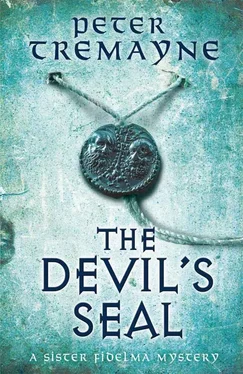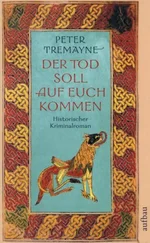Peter Tremayne - The Devil's seal
Здесь есть возможность читать онлайн «Peter Tremayne - The Devil's seal» весь текст электронной книги совершенно бесплатно (целиком полную версию без сокращений). В некоторых случаях можно слушать аудио, скачать через торрент в формате fb2 и присутствует краткое содержание. Год выпуска: 2014, ISBN: 2014, Издательство: Hachette UK, Жанр: Исторический детектив, на английском языке. Описание произведения, (предисловие) а так же отзывы посетителей доступны на портале библиотеки ЛибКат.
- Название:The Devil's seal
- Автор:
- Издательство:Hachette UK
- Жанр:
- Год:2014
- ISBN:9781472208330
- Рейтинг книги:3 / 5. Голосов: 1
-
Избранное:Добавить в избранное
- Отзывы:
-
Ваша оценка:
- 60
- 1
- 2
- 3
- 4
- 5
The Devil's seal: краткое содержание, описание и аннотация
Предлагаем к чтению аннотацию, описание, краткое содержание или предисловие (зависит от того, что написал сам автор книги «The Devil's seal»). Если вы не нашли необходимую информацию о книге — напишите в комментариях, мы постараемся отыскать её.
The Devil's seal — читать онлайн бесплатно полную книгу (весь текст) целиком
Ниже представлен текст книги, разбитый по страницам. Система сохранения места последней прочитанной страницы, позволяет с удобством читать онлайн бесплатно книгу «The Devil's seal», без необходимости каждый раз заново искать на чём Вы остановились. Поставьте закладку, и сможете в любой момент перейти на страницу, на которой закончили чтение.
Интервал:
Закладка:
‘But what of the other deaths?’ Brehon Fíthel asked. ‘Are you saying the same person — one person — was responsible for all of them? If so, I have been told that some of them took place while Deogaire was being held as a prisoner. If he was not responsible for the attempt on your lives, who was?’
‘Deogaire is most assuredly innocent — but I had to hold him to allay the suspicions of the killer and later to protect his life in case he too was attacked. For I have to say, this killer has no compunction about sacrificing the innocent.’
Brother Conchobhar leaned towards his nephew and clapped him on the shoulder in congratulation. Deogaire was looking relieved.
‘But then it means that Beccan was the guilty person,’ Colgú concluded. ‘But how. .? He was also murdered, and so was Sister Dianaimh.’
‘We have a saying that whether it is black, dun or white, it is its own kid that the goat loves,’ Fidelma suddenly said.
‘And so?’ Brehon Fíthel was clearly puzzled and he was not alone.
‘I think everyone will recall that Beccan was of the Déisi. They are the people who live south of the River Siúr,’ she added for the benefit of the Venerable Verax and his companions. ‘When Beccan spun the false story about seeing a woman named Maon — who actually turned out to be a man called Maon who was one of Rudgal’s outlaws — he let slip that his home was at Míodán. Prince Cummasach, when he brought Rudgal as prisoner here, told us that Rudgal and his band had been caught near their home at Míodán.’
‘Are you saying that Beccan was one of them?’ demanded Brehon Fíthel.
‘Beccan did not have that capability,’ Fidelma responded. ‘It was his inability even to remember names that almost caused his downfall but has led to another confirmation of the plot. Beccan was afraid of forgetting a fictitious name. It had been observed here that whenever my brother had guests, Beccan had to write them down. So he decided to stick to the real name of the person he was to meet because he knew him well from his own village. Beccan was forced into this conspiracy by his very own family and was used to draw a false trail when the person concerned mistakenly thought I was getting too close to them. Sadly I was not, otherwise. .’ She shrugged.
‘How was he persuaded?’ questioned Colgú. ‘I still don’t see.’
‘Because I think we will discover that he was related to the main deviser of this murderous conspiracy and also to Rudgal and his outlaws at Míodán.’
‘You said Beccan was told to lead a false trail,’ Brehon Fíthel frowned. ‘By whom and how?’
‘Beccan was told to implicate Deogaire in this matter. Unfortunately, honesty of thought often leads to a bad reputation. Deogaire made no secret that he did not share the Faith and so we, in our prejudice, could believe anything about him. So if Deogaire was made to appear guilty — guilty of something — it could direct us away from the truly guilty. It was a complicated plot.
‘Someone knew about Deogaire’s argument with his uncle. There had been a witness. That person instructed Beccan to do the following: he suggested to Deogaire that he could stay in the guest quarters that night. The idea of it being done in exchange of some medicines was firstly to allay any suspicion that Deogaire might have as to why Beccan had suddenly become friendly enough to make the offer, and secondly to give Beccan an excuse to leave the palace that night. You see, Maon and his companion had to be alerted to the news that Eadulf’s brother Egric had survived the attack on the Siúr and that he had gone to Eatharlach with Dego. The murderer had come to the wrong conclusion — that Egric must have saved the pallium and the bullae and hidden them. He had to instruct Maon to chase Egric. Why didn’t the murderer go himself? Because there was no way he could leave the palace without being missed and giving rise to questions.
‘All went as it was meant to. The real killer levered one of the statues so that it would fall. I don’t think it was meant to kill us because there was no guarantee that it would do so. I believe it was simply part of a general plan of distraction. We were meant to find Deogaire in the guest quarters and jump to the conclusion that he was responsible. In retrospect, it was a foolish idea because, while we imprisoned Deogaire, once Beccan reappeared, his story would clearly be contradictory. Did the killer think we would simply believe Beccan instead of Deogaire and that would be an end to it? Did this person think that we would not check out Beccan’s story about Maon — the so-called ill woman? Or did they think that we might then place the entire blame on Beccan? I confess that I did so, at first.’
‘Was it Beccan’s death that caused you to change your mind?’ asked Colgú.
‘I had found out that anyone could exit and gain entrance by way of the scaffolding without being seen at the gates. So at first I was convinced that Beccan had probably done so.’ Fidelma sighed. ‘The biggest mistake of all was when the initiator of the plot killed Beccan. I can only conclude that he feared that Beccan, when confronted, would immediately reveal all under questioning.’
‘So how did you proceed?’ Brehon Fíthel asked.
‘As I said, there were no witnesses to any of the murders so there was nothing to do but concentrate on the facts as I knew them. It was by a process of elimination that I came to my suspicion. There was now only one person around at the times of all the murders; this same person also had a connection with the village of Míodán and had been in Láirge’s harbour when Victricius and Egric landed there.’
She paused for a moment and the gathering leaned forward on the edge of their seats. If anything, Fidelma in her career as dálaigh had acquired the use of a dramatic pause in the courts.
‘What I did, therefore, was set a trap — a ruse by which the guilty person would reveal themselves. A ruse to obtain the coibsena or confession, as I have explained before. Certain people here were told that Egric had, indeed, been keeping in his possession a box which he had been hiding. A rumour was spread that Eadulf had brought that box back to Cashel and placed it for safekeeping in Brother Conchobhar’s apothecary. On hearing this, the guilty person would, we hoped, break in and try to steal it.’
She paused again and looked at their expectant faces.
‘Our trap worked. Last night, two people broke into the apothecary of Brother Conchobhar.’
CHAPTER TWENTY-ONE
Fidelma now had their complete attention. ‘The first person to break in’, she told them, ‘was Brother Bosa.’
When the ensuing hubbub had died down, Bishop Arwald was on his feet, his face contorted in anger.
‘Are you claiming that Brother Bosa is guilty of these crimes? I have known him as a loyal servant of the custodia of Canterbury for these last five years. Why, he was not even here when-’
‘Sit down!’ Brehon Fíthel ordered sharply. ‘Brother Bosa, did you break into the apothecary of Brother Conchobhar last night?’
Brother Bosa rose. ‘I do not deny it.’
‘For what purpose?’
‘To retrieve the items exactly as has been claimed.’
‘You need to explain the motive,’ Fidelma told him above the loud exclamations.
‘I am a member of the custodia of Canterbury. As a custodes it was my duty to retrieve these stolen items and return them to the rightful owner once I discovered where they were.’
‘I would ask you another question, Brother Bosa. Bishop Arwald has mentioned that Brother Cerdic was a newcomer to the custodes . Is that correct?’
Читать дальшеИнтервал:
Закладка:
Похожие книги на «The Devil's seal»
Представляем Вашему вниманию похожие книги на «The Devil's seal» списком для выбора. Мы отобрали схожую по названию и смыслу литературу в надежде предоставить читателям больше вариантов отыскать новые, интересные, ещё непрочитанные произведения.
Обсуждение, отзывы о книге «The Devil's seal» и просто собственные мнения читателей. Оставьте ваши комментарии, напишите, что Вы думаете о произведении, его смысле или главных героях. Укажите что конкретно понравилось, а что нет, и почему Вы так считаете.











